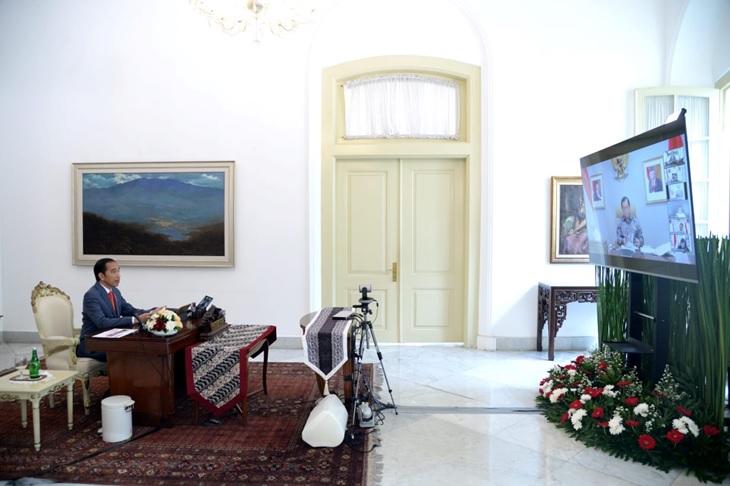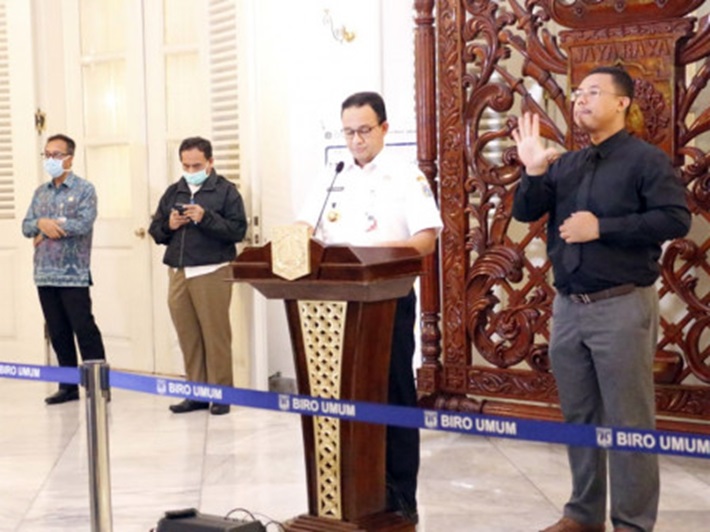IDEスクエア
分断社会における新型コロナウイルス対策――インドネシアの事例
PDF版ダウンロードページ:http://hdl.handle.net/2344/00051711
イルマン・G・ランティ
2020年4月
(4,869字)
2019年大統領選とイスラーム主義勢力の台頭
ジョコ・ウィドド(通称ジョコウィ)大統領が再選を果たした2019年の大統領選挙は、インドネシア史上最も候補者間の対立が激しい選挙となった。対立候補であるプラボウォ・スビアントを支持するイスラーム主義勢力が台頭し、世俗派のジョコウィの再選を阻止しようと結束したため、選挙戦は非常に緊迫したものとなり、社会に分断が生じた。
かつてのインドネシアの選挙における対立といえば人々が集まるところで起きるものだったが、2019年の選挙では対立の場はサイバー空間へと移った。インドネシアは、約2億7000万の人口のうち1億6000万人がソーシャルメディアを使うというインターネット大国である。そのため、サイバー空間ではフェイクニュースが次から次へと飛び交って政治的な対立があおられる事態となった。それがもたらした結果も深刻で、家族同士や友人同士が言い争いをするようになった。
イスラーム主義勢力の台頭は突然始まった。2016年12月2日、反ジョコウィの大規模な大衆動員が行われた。ジャカルタ中心部で行われたデモには数十万人が参加し、かつてない大規模な政治デモになった。「212行動」と呼ばれたこのデモは、首都ジャカルタの州知事バスキ・チャハヤ・プルナマ(通称アホック)がイスラーム教の聖典コーランを侮辱したことに反発して組織されたものである。アホックは、2012年にジョコウィが首都ジャカルタの州知事に当選したときの副知事で、ジョコウィが大統領に就任するとともに自動的に知事に昇格した人物であるが、中国系キリスト教徒というインドネシア社会では二重の意味で少数派に属していた。
ジョコウィとプラボウォの2019年大統領選における得票率の差は、前回2014年の選挙の時よりもわずかに広がったが、対立が鎮まることはなかった。選挙結果を不服とするプラボウォ陣営が憲法裁判所に訴えを起こすとともに、ジャカルタをはじめとした複数の都市でデモが行われ、暴動に発展した。これに対して政府は野党活動家を逮捕し、彼らを訴追した。
ただし、政治的な分断は2019年10月に新内閣が発表されて終わりを迎えたように思われた。というのも、分断を修復しようとするさまざまな努力が陰で行われた結果、選挙ではジョコウィと戦ったプラボウォが国防相として入閣したからである。イスラーム主義勢力はジョコウィ陣営に加わったプラボウォを失ったことで結集の軸となる別の人物を探さなくてはならなくなり、しばらくは目立った動きもみられなくなった。長期にわたった選挙戦で生じた社会の分断も徐々に修復されていったように思われた。

新型コロナウイルスと社会の分断
そこに新型コロナウイルスが襲ってきた。インドネシアに新型コロナウイルスの感染が広がったのは、他国と比べても遅い方だった。最初の感染者が公表されたのは、シンガポール、マレーシア、タイ、フィリピンなど近隣の国々で新型コロナの感染が確認されたずっと後の3月2日のことである。しかし、その後にウイルスの感染が国内で拡大していったスピードは、中国、アメリカ、韓国、イラン、ヨーロッパ諸国ほどではないにしても、憂慮すべきものだった。最初のケースが報告されてから6週間後には、感染者数が5000人を超えた。さらに憂慮すべきは、感染者数に占める死亡者の割合がきわめて高いことで、世界的な平均の4.5%を大きく上回る約9%となっていることである。
インドネシアにおける感染拡大のペースは、韓国やイラン、イタリア、アメリカ、ヨーロッパ諸国における急拡大よりも、むしろ近隣諸国に似ている。しかし、インドネシアにおける市民のパニック的な反応は、おそらく他国のそれを上回るものである。このようなパニックは、インドネシアにおける公共サービス、特に医療部門に対する国民の信頼が欠如していることによって引き起こされている。また、今日のようなデジタル時代において国民とどうコミュニケーションを取るのかという戦略が政府に欠如していることも新型コロナによって明らかになった。
しかし、インドネシアにおける新型コロナ対策で興味深いのは、その社会政治的な側面である。プラボウォをジョコウィ内閣に入閣させたことで示された国民統合のイメージは、まさに「イメージ」そのものだった。新型コロナの問題をみれば、政治的な支持と結びついた社会の分断——それは、インドネシアにおいてはしばしば宗教的な分断とも一致するのだが——は、依然としてかなりの程度存在しているというのが現実である。
最近になって、ソーシャルメディアでは再び激しいやり取りが見られるようになりつつある。前回の大統領選でジョコウィに反対していた人々は、政府の新型コロナ対策の遅れや場当たり的な対応を攻撃するというまたとない機会を得た。一方、大統領を支持する人々は政府の対策を擁護したり正当化したりしようとしている。

大統領とジャカルタ州知事の対立
興味深いのは、ジョコウィ大統領とジャカルタ州知事のアニス・バスウェダンとの間で対立が鮮明になっていることである。アニスは、2017年の州知事選で宗教冒涜の汚名を着せられたアホックを破り州知事に就任した。その際アニスはイスラーム系の政党に擁立されたが、2024年の次の大統領選でも有力な候補者になるとみられている。現職のジョコウィは、憲法で2期10年までの任期制限があるため、次の選挙には出馬できない。そこで世俗派の陣営は、ジョコウィの次を担う人物を探し求めている。
新型コロナウイルス対策で、このジョコウィとアニスの2人の政治家が互いに競い合っている状況である。先手を取ったのはアニス州知事だった。アニスは、ジャカルタでウイルスの感染が拡大しており危険な状況に近づきつつあると述べ、ジャカルタに非常事態を宣言しようとした。ただし、その権限は地方政府にはないとして、宣言の発出は中央政府から止められてしまった。また、アニスは、州内のどの地区でウイルスが広がっているのかを住民がウェブサイトで知ることができるようインターネットのシステムを構築した。
アニス州知事がこれらの措置を次々と取り始めた時、中央政府はいまだ本格的な対策に乗り出しておらず、保健相をはじめ、インドネシアで新型コロナウイルスの感染が拡大する可能性については否定的な意見をもつ政治家も政権内にはいた。アニスの行動はイスラーム主義の支持者から高く賞賛され、一般の住民も、数週間前に発生したジャカルタでの洪水に対して適切に対応できなかった州知事のことを見直した。一方で、アニスに対して批判的な人々は、新型コロナ対策に何か落ち度がないかと必死であら探しをしている。州政府が鉄道やバスの運行を制限したことで大混雑が発生した際には、ここぞとばかりに市民の不満が書き立てられた。
これに対して、中央政府は、感染拡大に対して準備不足だったことと、それが市民の間にパニックを引き起こしたことを強く批判されている。そのような批判を受けて、ジョコウィ大統領は、日本の富士フイルムホールディングスが製造している抗インフルエンザ薬「アビガン」200万錠と抗マラリア薬「クロロキン」300万錠を輸入することを急遽発表した。これらの薬の新型コロナ感染者に対する治療効果は、日本を含む世界中の多くの国でいまだ治験中であり分かっていないが、インドネシア政府は、アビガンの効果がいくつかのメディアで報道されると素早くその調達に動き、世界保健機構(WHO)がクロロキンの治療効果はまだ不明であると述べているにもかかわらず、報道の2日後には数百万錠の薬が空軍輸送機によってジャカルタの空港に到着した。中央政府のこうした性急にも見える行動の背景には、イスラーム系のジャカルタ州知事に対して世俗系の中央政府がイメージで負けてしまっている状況を早急に回復したいという意図があるとみられる。
新型コロナウイルスとインドネシア政治の「ニューノーマル」
その後、中央政府と地方政府はより協調しながら行動するようになりつつある。4月10日、ジャカルタ州政府は首都圏地域における「大規模社会制限(PSBB)」を開始したが、これは州政府からの要請を中央政府が承認したうえで実行に移された1。4月15日からはジャカルタに隣接する西ジャワ州やバンテン州でも同様の措置が実行に移されている。しかし、アニスの支持者たちは、中央政府の対応を遅きに失している、不十分であるとして不満を表明している。他方、世俗派の陣営も引き下がってはおらず、PSBBの実施にもかかわらず人出や交通が減少していないことから、アニス州知事とジャカルタ州政府の実行能力を批判している。
インドネシアでは次の選挙までまだ4年間ある。新型コロナウイルス感染の衝撃は、インドネシア社会にいまだ社会政治的な分断がはっきりと残っていることを浮かび上がらせた。おそらく、将来はこのような分断が存在すること自体が「ニューノーマル(新常態)」とみなされるようになるだろう。しかし、少なくともいまのところ、国民は次の選挙がどのようになるのかということを目撃していることは確かである。
(翻訳 川村 晃一)
写真の出典
- 写真1 国家官房Facebookページ
- 写真2 ジャカルタ首都特別州政府ホームページ
著者プロフィール
イルマン・G・ランティ(Irman G. Lanti) 元アジア経済研究所海外客員研究員(2020年1〜3月)。ナショナル大学大学院(インドネシア)講師。専門はインドネシアおよび東南アジア政治、国際関係学。主な著作に、"Examing the Growth of Islamic Conservatism in Indonesia: The Case of West Java," RSIS Working Paper, No. 322, Rajaratnam School of International Studies, Nanyang Technological University, 2019、"Perceiving Indonesian Approaches to International Relations Theory," co-written with Leonard C. Sebastian, in Amitav Acharya and Barry Buzan, eds., Non-Western International Relations Theory: Perspectives on and beyond Asia. London: Routledge, 2010, pp. 148-173がある。
注
- (訳者注)「大規模社会制限」は、ジャカルタ州知事の要請にもとづいて保健相が承認して発動された。その内容は、企業の在宅勤務義務、学校の休校、屋外でのマスク着用義務、自家用車の乗客数制限、二輪車の複数による乗車禁止、公共交通機関の営業短縮、公共の場での活動禁止、レストランなどにおける屋内飲食の禁止などである。警察が義務履行の確認・指導を行っており、違反者に対しては罰金が科されることもある。
【特集目次】
新型コロナウイルスと新興国・開発途上国
- オセアニア地域における新型コロナウイルスへの対応
- 分断社会における新型コロナウイルス対策――インドネシアの事例――COVID-19 HANDLING IN A FRACTURED POLITY: CASE OF INDONESIA
- ブエノスアイレス都市圏の公共交通機関 ――新型コロナウイルス対策による「実質一日」の利用制限――
- ニューヨーク市で感染爆発したCOVID-19 と人種、所得・教育水準
- 新型コロナウイルスと海外ビジネス展開――国際線フライト運休の影響
- コロナ禍からの中国経済の立ち上がりをみる
- 新型コロナウイルス危機下で活発化するトルコの人道外交
- 新型コロナウイルスと新興国インバウンド観光
- 新型コロナウイルスによる死者が東アジアで少ないのは何故か ――重力方程式による解決
- 新型コロナウイルスとSDGs――サステイナブルなまちづくりへの「好機」となるか
- 新型コロナウイルス感染症を通してみるモザンビーク社会
- 朝鮮民主主義人民共和国の防疫体制
- 感染症対策と経済再建の両立を目指す韓国――ポストコロナに向けて死角はないのか?
- ベトナムの新型コロナウィルスと情報宣伝工作
- 「世界最大のロックダウン」はなぜ失敗したのか――コロナ禍と経済危機の二重苦に陥るインド
- リモートワークで出社勤務はなくなるか?――集積経済の視点
- 新型コロナ禍のなかのインドネシア――感染の拡大と景気後退
- 新型コロナ禍のなかのインドネシア(2)――雇用への影響
- 交換文化と自給生活でコロナ危機を乗り越えるフィジー
Irman G. Lanti
April 2020
2019 Presidential Election and Rise of Islamist Group
In 2019, Indonesia witnessed the most divisive elections in the history of the nation, where President Joko Widodo (a.k.a. Jokowi) sought reelection. The rise of Islamist groups uniting behind the rival candidate, Prabowo, and the determined effort to resist the rise by the nationalist Jokowi has created tense and polarizing campaigns. If in the past, conflicts surrounding elections in Indonesia tended to revolve around mass gathering campaigns, last year’s elections saw the conflicts move to the cyberspace. Indonesia has one the world’s highest number of social media users, with 160 million users out of its 270 million population. So the political conflict in cyberspace became a noisy one with fake news after fake news flying around. The effect of such political conflict was also quite massive, pitting friends and family members against each other.
The resurgence of the Islamist group started out with a bang. In December 2, 2016, massive people mobilization against Jokowi occurred, that culminated in the larger political demonstration ever happened in Indonesia, attended by hundreds of thousands in the center of Jakarta. The demonstration was launched against the religious blasphemy allegedly done by Basuki Tjahaja Purnama (Ahok), the Governor of Jakarta, an ethnic Chinese Indonesian who served as the Vice Governor when Jokowi was Governor of the capital city (known as Action 212 in December 2, 2016).
Jokowi won the reelection in 2019 with a slightly greater margin than what he got in the previous elections in 2014, but the divisiveness did not subside. A lawsuit aimed at nullifying the result of the elections was launched, preceded by a number of demonstrations in Jakarta and other cities in Indonesia that often ended in violence. The government responded by nabbing a number of opposition figures and prosecuted them.
This political schism in the society seemed to come to an end when the new cabinet line-up was announced in October 2019. Various political efforts behind the scene to reunite the country resulted in the acceptance of Prabowo (Jokowi’s rival in the elections) to join Jokowi’s cabinet as Minister of Defense. For a while the Islamist groups seemed to be inactive while apparently attempted to find an alternative figure to rally behind after the loss of Prabowo to Jokowi’s camp. The society also seemed to gradually make amends from the fracture that befell them in the long year of campaigning.
Covid-19 and Social Fraction
And then Covid-19 struck. Indonesia was among one of the late countries that reported the Covid infection. Its first case was announced only on March 2, long after the virus struck neighboring countries, like Singapore, Malaysia, Thailand, and the Philippines. But the intensity of the subsequent domestic transmission of the virus was quite alarming, although not quite at a rate that we saw in China, the US, South Korea, Iran, and European countries. Six weeks after the first was reported, there are now over 5,000 confirmed Covid infection cases in Indonesia. What was probably more alarming was the high fatality rate in Indonesia, which stands at around nine percent, much higher than the global average of around 4.5% nowadays.
The pace of surge in Indonesia’s cases of Covid 19 actually resembles more its neighboring countries, rather than the quick upsurge that we’ve seen in South Korea, Iran, and Italy, and now the US and European countries. However, the adverse panic reaction of Indonesians probably exceeds that of other countries. The Covid incident actually reveals the lack of trust of many Indonesians of government services, especially on the health sector. It also reveals the acute deficiency in how the government manages its public communication strategy, especially in the digital age like today.
But perhaps the more interesting side of the story of Indonesia’s handling of Covid-19 is what happened on the socio-political front. The image of national unity shown after the inclusion of Prabowo as one of Jokowi’s cabinet member seems to be basically just that, an image. The reality surrounding the Covid issue shows that the fraction in the Indonesian society along political lines, which in Indonesia often coincides with religion, is still alive and well.
Nowadays, Indonesians are witnessing a return of the bout in the social media. Those who tended to oppose Jokowi during the last election seem to receive new ammunition to rejuvenate the attack on the President, especially over the tentative and erratic handling of the Covid-19. Those who supported the President try to defend and rationalize the administration’s policy.
Competition between President and Jakarta Governor
Interestingly, there seems to be a heightened competition between Jokowi and the Jakarta Governor, Anies Baswedan. Anies won the governorship of the capital city in 2017, after defeating Ahok who was tainted by religious blasphemy case. Anies was supported by Islamist parties and is widely seen as one of the frontrunners for 2024 elections. Jokowi will not be able to run again in next election because of the constitutional limit of two-terms for presidents, but the nationalist camp will most likely attempt to court a figure to succeed Jokowi.
During the Covid-19 handling, the two figures appeared keen to outdo each other. Anies seemed to have an upper hand when he announced that Jakarta has come to a dangerous situation regarding the spread of the virus. He came close to announcing a state of emergency in Jakarta, only to be reminded by the Central government that the power to do so lies in the hand of the central and not local governments. He also developed a web-based system that can be accessed by the public about the spread of the virus in various districts in the city. All these were done at the time when the central government still looked very tentative in its steps and some figures in the administration, including the Minister of Health, still appeared dismissive of the veracity of the virus spread in Indonesia. Anies was cheered loudly by the Islamist supporters, and the general public has generally seen a marked improvement from the poor handling of the flooding that hit Jakarta just a few weeks prior. Anies’ detractors tried to find any loophole in his policy in handling Covid-19, and seemed to have a field day when citizens were complaining about the cutbacks in the schedule of public transportation that caused massive crowding in train stations and bus stops.
On the other hand, the central government was criticized heavily for appearing unprepared for the surge of the infection, creating almost a condition of mass hysteria. Amidst these criticisms, Jokowi suddenly announced that Indonesia would import two million pills of Avigan, a flu medicine produced by Fujifilm Toyama and three million pills of chloroquine. The efficacy of these two medicines to cure Covid-19 patients are still under testing in many countries in the world, including in Japan. But the Indonesian government worked in a lightning speed and two days after the news of Avigan’s supposed efficacy appeared in some media outlets, and WHO was still doubtful of the efficacy of chloroquine, millions of pills of these medicines have arrived on an Indonesian Air Force transport in Jakarta military airport. Some analysts perceived that such haste was motivated by the desire to appear decisive and quick to make up for some of the loss in positive imagery of the nationalist government to the Islamist Jakarta Governor.
Covid-19 and "New Normal" of Indonesian Politics
More recently, the central and local governments appear to have been working more closely with each other. On April 10, the Jakarta government has implemented the Major Scale Social Restriction (PSBB) in the metropolitan based on the approval of central government on the request from Jakarta government to implement such restriction. This was then followed by the enactment of similar restrictions in the Jakarta hinterland areas of West Java and Banten provinces on April 15. However, Anies’ supporters appeared to be unimpressed by the central government’s decision, calling it late and insufficient. On the other hand, flak also continued to come from the nationalist camp, especially criticizing Anies and the Jakarta government for failing to enforce the restriction as evidenced from the continued buzz and traffic around Jakarta despite the restriction.
Elections are still four years away in Indonesia. The presence of the Covid-19 shock has demonstrated that the socio-political fracture in the Indonesian polity remains prevalent. Perhaps in the future such a fraction will be viewed as a new normal. But at least for now, the public is being served with a hint of how the next elections in Indonesia will transpire.
About the Author
Irman G. Lanti. Former Visiting Research Fellow of IDE (January-March 2020). Senior Lecturer of Graduate School, National University, Jakarta, Indonesia. His research interests lie in politics and international relations of Indonesia and Southeast Asia. His works include "Examing the Growth of Islamic Conservatism in Indonesia: The Case of West Java," RSIS Working Paper, No. 322, Rajaratnam School of International Studies, Nanyang Technological University, 2019, and "Perceiving Indonesian Approaches to International Relations Theory," co-written with Leonard C. Sebastian, in Amitav Acharya and Barry Buzan, eds., Non-Western International Relations Theory: Perspectives on and beyond Asia. London: Routledge, 2010, pp. 148-173.



